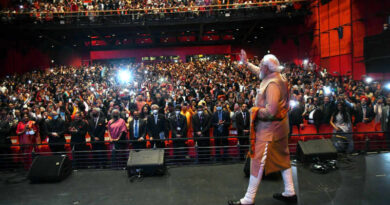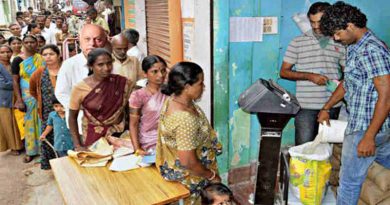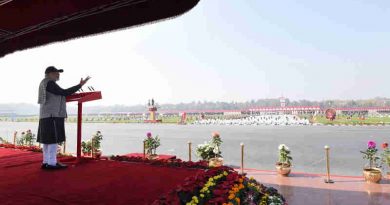Corruption Makes Governance Inefficient and Ineffective: Expert

The Director of the Sussex Centre for the Study of Corruption (SCSC), Dr Elizabeth David-Barrett, argues that many countries have good anti-corruption laws but they have hardly any impact on reducing graft because they are not implemented properly.
She suggests a number of ways to weed out corruption from the society and shares her candid views in an exclusive email interview with Rakesh Raman, the managing editor of Raman Media Network (RMN News Service).
Here’s the interview:
1. What is the impact of corruption on the governance in a country?
Political corruption occurs when someone in public office violates some of the duties associated with the office and is motivated to do so by the promise of private gain. At its core then, political corruption is a distortion of governance. It means that public servants are abusing their power and putting private interests above the public interest. Instead of serving the people, they are serving their own interests – and abusing the power with which they are entrusted to do that.
That can have all kinds of effects on governance, depending on which area of government the official works in. If the corrupt official works in the transport ministry, and they give a contract to a company not because it is the best one for the job but because it is owned by their brother, or by a crony who gives them a kickback, it might mean that roads are built to sub-standard quality, and that might lead to a range of negative consequences ranging from money wasted on road maintenance to avoidable car accidents that hurt or kill people.
In general, corruption can make governance inefficient and ineffective, it can distort public policy priorities so that some important things get overlooked or under-resourced, and it can mean that people are not treated equally before the law. Ultimately, all of those things also mean that people stop trusting government and that can mean they don’t want to pay taxes or abide by laws themselves, because they don’t see them as legitimate.
2. Can we empirically measure the impact of corruption? If yes, how?
Measuring corruption itself is extremely difficult, because those involved want to cover it up and usually have the power to do so as well; but measuring the impact of corruption is even harder. Some classic research, e.g., by Paulo Mauro, shows that corruption hinders economic development, for example, by deterring investment. The relationship between corruption and democracy is contested – corruption seems to hinder democratization but weak democratic institutions also allow corruption to flourish. And other research looks at the very real impact on people’s lives. Ambraseys and Bilham show that, because corruption undermines urban planning and standards in construction, countries with higher levels of corruption see more people die when natural disasters such as earthquakes occur.
In recent years, there has been a race to find the best proxies of corruption in different areas, and then to use those to measure corruption’s impact on factors such as how much public money is wasted in various ways. Miriam Golden and Lucio Picci show how varying levels of corruption lead to vast differences in public money spent on road building in different parts of Italy. In my work with Mihály Fazekas, we examine how public procurement procedures can be manipulated to distribute contracts to cronies, and measure these risks using ‘red flags’ in big datasets on government contracting.
3. As most corrupt officials do not get punished, how do we deal with impunity?
This is a real problem. First, it is common for corrupt officials to go unpunished. After all, if the system is corrupt, then the people who are supposed to enforce the rules – whether police, judges or prosecutors – are likely to be corrupt themselves. Second, this then undermines motivations for others to comply. If nobody is punished for cheating, perhaps especially those at the top, then everyone starts to feel like it is okay to cheat – or, at least, foolish to stand up for integrity against the flood of corrupt behavior.
How do we deal with it? I think we have to both improve law enforcement and work on changing norms. We can make law enforcement more independent and professional by building its capacity, for example, and changing the way we hire and promote police officers. We also need to fight the sense of impunity by supporting champions of anti-corruption, ambassadors for public service with integrity. Changing norms is not just about getting rid of old norms, but it also requires the building of new ones.
4. It is largely observed that the law-enforcement officials themselves are extremely corrupt, then how will they help check corruption? It’s like a thief trying to catch another thief. What is the remedy to stop corruption in such a situation?
This is the ‘who guards the guardians?’ problem epitomized by Roman satirist Juvenal in one of his plays, where a character ruminates about the problem of guarding his wife’s honor while he is away, given that the guards themselves are not honorable.
5. Do you think that the tax systems in a country spur political corruption, as politicians squander public money at will?
Tax systems don’t necessarily spur corruption. Ideally, paying taxes is part of a social contract between the people and the state: people allow the state to collect tax from them in exchange for receiving security and public services. However, that social contract can easily be undermined by corruption. If politicians spend money on private interests rather than to further the public interest, then people are less likely to want to pay tax. Also, if people see that the wealthy, or large corporations, are able to fix their accounts so as to avoid tax, that can also undermine tax compliance among ordinary people and smaller firms.
Another problem is that tax authorities are often quite corrupt. They have considerable power, and sometimes they abuse it to overlook tax evasion – in exchange for bribes. This can even be extortion, with corrupt tax officials threatening to ‘find problems’ unless they are paid off. And in most countries, the tax code is so complicated, it is fairly easy to find problems.
6. Is there any reliable legal framework to hold corrupt bureaucrats and politicians accountable and punish them suitably?
As you mentioned in your question earlier, the problem is not so much the legal framework as the implementation of laws. Many countries have good anti-corruption laws but they have had little impact on reducing graft because they are simply not implemented. But what does seem to work is building up a really effective ‘accountability ecosystem’ – that is, a range of institutions and actors that have some autonomy and expertise, and can hold bureaucrats and politicians to account. This can include independent audit institutions and anti-corruption agencies, but it can also be investigative journalists and local community groups, and even private-sector companies that want to act responsibly and operate in a fair system. Transparency can also be helpful, because that allows all of these other actors to obtain evidence and to ask questions.
The research suggests that this accountability ecosystem is the really important thing for fighting corruption and sustaining the fight. But it also takes a long time, significant resources, and it is difficult to do without support from at least some parts of the government. That means, for countries with really serious corruption problems, it can be difficult to get over the initial opposition to reform. If you do manage to do that, the ecosystem starts to flourish and institutions support one another, and then change can happen relatively quickly.
7. As part of the academic studies, how do we educate youth about the evil effects of corruption and the related issues?
Young people can be a real force for change. Young people are generally more idealistic. They often have a strong sense of right and wrong, feel solidarity with other humans regardless of differences in identity, and believe that power should be used for good. They get really angry about injustices and unfair application of the law. By contrast, older people who have grown up with corruption often think it is inevitable and, even if they don’t like it, feel powerless to change it.
So when educating young people, we need to do two things. First, we need to show how damaging corruption can be. Sometimes this is a matter of providing evidence – either from the research, or by looking at individual cases, whether local or international. But it can also be helpful to just have people imagine how much easier their lives would be if corruption disappeared tomorrow. Second, we need young people to believe that they can make a difference. There have been some fantastic initiatives in recent years where people came together to demonstrate against corrupt politicians or used new technology to catch them out and hold them to account. Young people are often at the forefront of these new developments, bringing energy, creativity, and inspiration.
Dr Elizabeth David-Barrett is the Director of the Sussex Centre for the Study of Corruption (SCSC). She leads the Centre’s activities in research, teaching, and policy impact and engages widely with anti-corruption practitioners in governments, the private sector, and NGOs.





